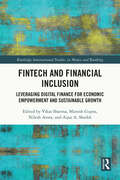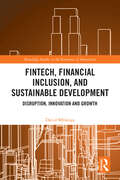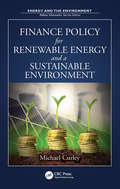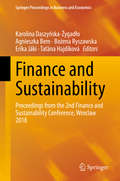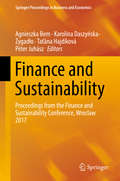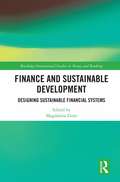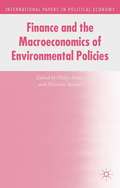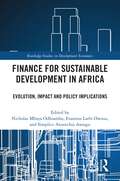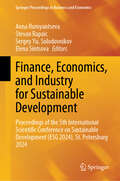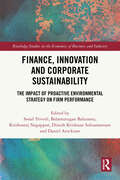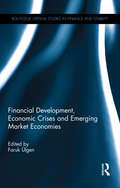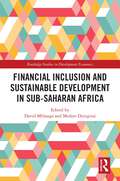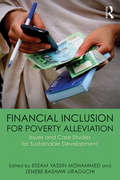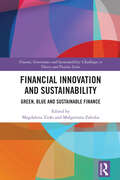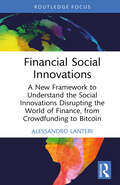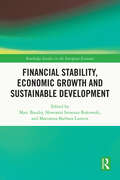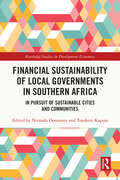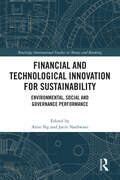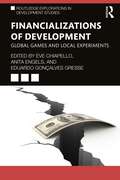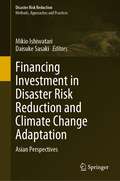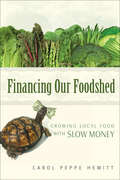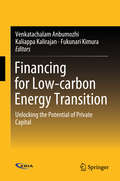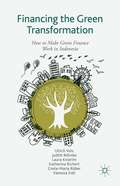- Table View
- List View
FinTech and Financial Inclusion: Leveraging Digital Finance for Economic Empowerment and Sustainable Growth (Routledge International Studies in Money and Banking)
by Vikas Sharma Aijaz A. Shaikh Munish Gupta Nilesh AroraFinTech and Financial Inclusion is a comprehensive edited volume exploring the transformative impact of financial technology on expanding access to financial services and fostering sustainable economic development. This collection brings together insights from leading scholars and practitioners across 20 chapters, offering a multifaceted examination of fintech innovations and financial inclusion globally.The book covers key topics such as the role of financial and digital literacy, fintech’s impact on financial systems and economic growth, and case studies from countries like Ghana and India. It delves into technological aspects of fintech, including artificial intelligence (AI) in banking and social media in financial education, while also addressing trends, challenges, and opportunities in fintech adoption. The volume doesn’t shy away from ethical considerations and risks associated with fintech, exploring issues of security, privacy, and trust in digital finance. Gender equality in financial inclusion receives significant attention, with a focus on empowering women through financial access. Throughout, the book provides a balanced mix of theoretical frameworks, empirical studies, and practical insights, making it an invaluable resource for academics, policymakers, fintech entrepreneurs, and financial sector professionals.By bringing together various perspectives, this volume enhances our understanding of how technological innovations can create more inclusive and sustainable financial systems worldwide, addressing both the transformative potential of fintech and the challenges for responsible implementation in diverse economic contexts. The core readership includes researchers, students, policymakers, and stakeholders involved in various aspects of finance, technology, sustainability, and policy. It serves as a guide for those looking to understand the practical applications of blockchain in driving environmental change and offers a visionary outlook on the technology’s potential to reshape industries sustainably.
FinTech, Financial Inclusion, and Sustainable Development: Disruption, Innovation, and Growth (Routledge Studies in the Economics of Innovation)
by David MhlangaThis book explores the significant impact of FinTech on the financial industry and how it could be used to promote legitimate development in the global economy. It takes readers on an engaging tour of the field of FinTech, immersing them in a thorough investigation of the technological advancements, creative business models, and regulatory issues that define the FinTech landscape.The book begins by documenting the rise of FinTech, providing historical context, and highlighting key milestones. It delves into the numerous technologies that have fuelled the FinTech revolution and offers valuable insights into the ongoing evolution of the financial industry and its implications for individuals, businesses, and society. It explores topics such as microfinance, digital lending, social impact investing, and sustainable finance, signalling the ability of FinTech to foster financial inclusion, reduce poverty, and drive sustainable economic growth in developing economies. The book takes into account ethical as well as regulatory considerations, and the importance of striking a balance between innovation and consumer protection. The book offers a comparative regional perspective and provides case studies of successful FinTech organizations from across the world. It concludes by providing an in-depth exploration of future trends and predictions, with a specific focus on emerging technologies such as ChatGPT and their potential impact.This will be a useful reference for researchers, scholars, and students, concerned with the changing dynamics of the industry in an increasingly digital and interconnected world.
Finance Policy for Renewable Energy and a Sustainable Environment (ISSN)
by Michael CurleyThis book explains how environmental projects and improvements are achieved through the imposition of regulations, on the one hand, and financial incentives on the other. It discusses how those incentives can be organized to achieve the greatest environmental benefits at the lowest possible cost to the public. It presents the best environmental finance policies for the financing of alternative energy projects so that the ultimate cost of delivered power will decline. It also examines the challenges of the next generation of environmental programs.
Finance and Sustainability: Proceedings from the 2nd Finance and Sustainability Conference, Wroclaw 2018 (Springer Proceedings in Business and Economics)
by Agnieszka Bem Karolina Daszyńska-Żygadło Taťána Hajdíková Bożena Ryszawska Erika JákiThis volume presents the proceedings of the ZAFIN Finance and Sustainability conference, organized by the Wroclaw University of Economics in cooperation with Corvinus University of Budapest and the University of Economics in Prague. The contributing authors analyze a variety of issues concerning recent finance problems, including corporate finance, public finance, monetary and fiscal policy issues, and risk management. The book also addresses topics connected to sustainable finance, the transition to green economies, corporate sustainability and sustainable development. The target audience for this book includes researchers at universities and research and policy institutions, graduate students, and practitioners in economics and finance working for private or government institutions.
Finance and Sustainability: Proceedings from the Finance and Sustainability Conference, Wroclaw 2017 (Springer Proceedings in Business and Economics)
by Péter Juhász Agnieszka Bem Karolina Daszyńska-Żygadło Taťána HajdíkováThis volume covers the proceedings of the ZAFIN Finance and Sustainability conference, organized by the Wroclaw University of Economics in cooperation with the Corvinus University of Budapest and the University of Economics in Prague. The authors analyze a variety of issues related to recent finance problems, including corporate finance, public finance, monetary and fiscal policy issues, and risk management. The book also discusses topics related to sustainable finance, the transition to green economies, corporate sustainability and sustainable development. The target audience for this book includes researchers at universities and research and policy institutions, graduate students, and practitioners in economics, finance and international economics working for private or government institutions.
Finance and Sustainable Development: Designing Sustainable Financial Systems (Routledge International Studies in Money and Banking)
by Magdalena ZioloThere are many studies confirming the relationship between financial systems and economic development, but there are few which examine the degree to which financial systems a) impact the quality of information, b) influence sound corporate governance, c) ensure effective mechanisms of risk management, d) mobilize savings and f) facilitate trade. In the context of sustainability, there should also be a line of inquiry into how a particular financial system influences the assurance and implementation of sustainable development principles and goals. This book delivers a methodological approach to designing and assessing sustainable financial systems. It provides an original contribution by prioritizing ESG factors in the decision-making process of financial institutions and identifying their impact on sustainable financial systems. The author argues that to achieve financial stability, it is necessary to have in place mechanisms designed to prevent financial problems from becoming systemic and/or threatening the stability of the financial and economic system, while maintaining (or not undermining) the economy’s ability to sustain growth and perform its other functions. The book primarily takes a simulation and experimental approach. It is the first book to take such a comprehensive look at sustainable financial systems as opposed to sustainable finance in general. It will appeal to academics, students and researchers in the fields of economics, finance and banking, business, management and political and social sciences.
Finance and the Macroeconomics of Environmental Policies
by Philip Arestis Malcolm SawyerThis volume examines current and previous environmental policies, and suggests alternative strategies for the future. Addressing resource depletion and climate change are pressing priorities for modern economies. Planning energy infrastructure projects is complicated by uncertainty, as such clear government policies have a crucial role to play.
Finance for Sustainable Development in Africa: Evolution, Impact and Policy Implications (Routledge Studies in Development Economics)
by Nicholas Mbaya Odhiambo Erasmus Larbi Owusu Simplice Anutechia AsonguAlthough a number of selected African countries have made efforts to implement various financial sector reforms, many countries have not fully implemented the requisite reforms required for sustainable development. Instead, they have focused mainly on bank-based financial reforms, thereby neglecting market-based financial reforms. This study provides a one-stop shop for understanding the history and evolution of the financial sector in Africa with a special focus on the sub-Saharan region where the financial system in many countries is still at a relatively nascent stage. The analysis is extensive and robust, and starts from financial repression to financial liberalisation (both internal and external), and its role in sustainable development and poverty alleviation. The book covers a range of important research issues pertaining to financial development in selectede African countries, including interest rate and exchange rate reforms, the dynamics of bank-based and market-based financial development; the role of the informal financial sector in sustainable development; the finance-growth nexus; bank-based versus market-based financial sectors in Africa; financial development and information and communication technology; and financial development and gender equality, among other topics. The book also considers the relationship between the COVID-19 global pandemic and financial development, and concludes by presenting a forecast of the future trends of financial and sustainable development on the African continent in general and sub-Saharfan Africa in particular. The chapters are authored by prominent scholars and researchers in the field of finance and banking, applied econometrics and development economics, with a deep understanding and knowledge of financial development and the local situations in African countries. This book provides crucial reference material for academics, researchers, policymakers and students of all levels and is a must-read for anyone wishing to understand the nature of finance and sustainable development in Africa in relation to the rest of the world. It covers African countries, but with more emphasis on the sub-Saharan African region where the financial systems in many of the countries are still relatively underdeveloped.
Finance, Economics, and Industry for Sustainable Development: Proceedings of the 5th International Scientific Conference on Sustainable Development (ESG 2024), St. Petersburg 2024 (Springer Proceedings in Business and Economics)
by Anna Rumyantseva Elena Sintsova Stevan Rapaic Sergey Yu. SolodovnikovThis book explores business and governance solutions for achieving the Sustainable Development Goals (SDGs), adopted by all UN member states in 2015. It features the proceedings of the 5th International Scientific Conference on Sustainable Development (ESG 2024), held in St. Petersburg in 2024. Without adequate funding to invest in sustainable development and the transformation of energy and food systems, countries and companies cannot achieve stable financial positions. To meet the SDGs, all nations and businesses must invest in renewable energy, universal social protection, quality education, decent jobs, universal health coverage, sustainable food systems, infrastructure, and digital transformation. Incentives for SDG achievement address financing needs through a combination of various forms and mechanisms. Implementing these incentives will also necessitate broader changes in both national and international financial architectures. The book covers a range of fields, including sustainable development for the national and global economy, sustainable development in industrial and financial policy, financing sustainable transformations in industry, finance, and management, sustainable development principles in tax systems, and impact of sustainable development on financial markets among other topics. The book is intended for scholars and professionals involved in public and corporate finance, financial accounting and auditing, sustainable development risk management, economic growth, macroeconomics, monetary policy within a sustainable development environment, public and corporate governance, as well as corporate communications and public relations.
Finance, Innovation and Corporate Sustainability: The Impact of Proactive Environmental Strategy on Firm Performance (Routledge Studies in the Economics of Business and Industry)
by Balamurugan Balusamy Daniel Arockiam Sonal Trivedi Krishnaraj Nagappan Dinesh Krishnan SubramaniamThis book explores how the problem of global sustainability could turn into a major force for innovation leading to enhanced firm performance. It addresses whether proactive environmental strategy and innovation are integrated with a firm’s performance. The goal of this book is to advance the rapidly developing field of sustainable business beyond the straightforward logic of cost, waste and risk reduction.The authors offer significant insight into how internal—life cycle design—and external—image and reputation—innovation strategies serve to mediate and possibly reinforce one another by investigating the relationship between proactive environmental strategy and innovation in relation to firm performance. The book includes empirical research, case studies and real-world examples as well as lessons learned from the successful and unsuccessful transformation initiatives of numerous international companies.This book is primarily aimed at an academic audience of scholars, researchers and advanced students in the fields of finance, economics, sustainability, innovation and environmental studies and will also appeal to practitioners and industry experts in these areas.
Financial Development, Economic Crises and Emerging Market Economies (Routledge Critical Studies in Finance and Stability)
by Faruk UlgenRecurrent crises in emerging markets and in advanced economies in the last decades cast doubt about the ability of financial liberalization to meet the aims of sustainable economic growth and development. The increasing importance of financial markets and financial efficiency criterion over economic decisions and policies since the 1980s laid down the conditions of the development process of emerging market economies. Numerous crises experienced thereafter gave rise to flourishing work on the links between financialization and economic development. Several decades of observations and lessons can now be integrated into economic and econometric models to give more sophisticated and multivariable approaches to financial development with respect to growth and development issues. In the markets-based and private-enterprise dominated world economy, two conditions for a successful growth-enhancing financial evolution can at least be brought fore: macroeconomic stability and consistent supervision. But even after the 2007-2008 global crisis, economists do not agree on the meaning of those conditions. For liberal and equilibrium-market economists, good finance and supervision mean market-friendly structures while for institutionalists, post-Keynesian and Marxist economists, good finance and supervision must lie in collectively designed and managed public structures. Drawing heavily on the tumultuous crises of the 1990s-2000s, this book argues that those experiences can shed light on such a crucial issue and lead economic theory and policy to go beyond the blindness of efficient free markets doctrine to economic catastrophes. It also points to new challenges to global stability in the wake of reconfiguration of international financial arena under the weight of major emerging market economies.
Financial Inclusion and Sustainable Development in Sub-Saharan Africa (Routledge Studies in Development Economics)
by David Mhlanga Mufaro DzingiraiThis book delves into the transformative power of the Fourth Industrial Revolution (4IR) in reshaping the landscape of sustainable development in one of the world's most vibrant regions. This edited volume explores the synergy between cutting-edge digital technologies and innovative financial strategies to drive responsible business practices that align with the Sustainable Development Goals (SDGs).This book navigates the complex interplay between technological advancements, financial inclusion, corporate social responsibility, environmental stewardship, and ethical governance. It critically assesses how digital innovations—ranging from artificial intelligence, blockchain, and the Internet of Things (IoT) to green technologies and fintech—alongside novel financial instruments such as green bonds and impact investing, can address key concerns such as poverty alleviation, gender parity, and environmental sustainability. With a wide range of expert contributions, this volume offers useful insights and practical solutions to promote financial inclusion and encourage sustainable growth in Sub-Saharan Africa. It achieves this through a combination of empirical research, case studies, and policy analysis.This resource is crucial for policymakers, scholars, and development practitioners who are dedicated to advancing inclusive and sustainable development.
Financial Inclusion for Poverty Alleviation: Issues and Case Studies for Sustainable Development
by Essam Mohammed Zenebe UraguchiMore than one billion people still live below the poverty line – most of them in South Asia and Sub-Saharan Africa. Financial inclusion is a major issue, as more than three-quarters of the numbers of poor and disadvantaged women and men do not have access to financial products and services, such as bank accounts, affordable and suitable loans, and insurance. The key objective of this book is to provide practical case studies of financial inclusion, rather than focus on academic debates such as the ideological basis of promoting microfinance. Using the recently adopted Sustainable Development Goals as an overall framing of the issues, it shows how poor and disadvantaged women and men can be bankable if the right facilitation for maximizing opportunities and addressing constraints are in place. Case studies confirm that achieving inclusive and sustainable access to financial products and services goes beyond simply enabling poor and disadvantaged women and men to have access to credit, or the ability to open a bank account. Examples from Africa, Asia and Latin America demonstrate encouraging progress in making microcredit accessible to millions of poor people. The foremost challenge, however, has been to ensure that they have access to, and usage intensity of, suitable and affordable financial products and services that meet the needs of their livelihoods as well as risks and mitigation strategies. This requires understanding that poor and disadvantaged women and men do not exist in isolation from complex and interdependent functions in the financial system, which includes a number of actors, diversified services, constraints (not just symptoms) and capacities and incentives. Overall, the book provides a rich source of examples of how building inclusive financial systems can empower the world's poor – by increasing income and employment opportunities, securing livelihoods and reducing poverty.
Financial Innovation and Sustainability: Green, Blue and Sustainable Finance (Finance, Governance and Sustainability)
by Magdalena Zioło Małgorzata ZaleskaIn recent years, factors such as sustainability, digitalization, climate change, energy transformation, social inclusion, gender parity, and Environmental, Social and Governance (ESG) risk have been playing an increasingly important role in the process of financial transformation. The effect of the impact is increased regulation and guidance for financial markets, in relation to adapting current activities to meet the new challenges, for example: The process of greening finance and spreading the blue wave in finance Building sustainable value in the business models of financial institutions Creating an offer of sustainable financial products Ensuring parity between women and men in the decision-making bodies of financial institutions Sustainable ratings Climate stress tests This book focuses on the intersection between nature and finance and offers a comprehensive overview of the trends, transformations and challenges in finance and the financial markets related to the effects of sustainability concepts or ESG factors. The book has been designed to show these trends, through the evolving subdisciplines of finance, such as green and blue finance. It presents critical recommendations for the ecosystem and network of finance in the era of ESG and sustainability and paints a comprehensive picture of contemporary finance, identifying the factors determining its sustainable transformation.This is one of the first books to present the issues of sustainability and ESG risk in finance through the prism of individual types of finance. Not only will the book appeal to scholars and researchers in the field of banking, economics, finance and accounting, but it will also find an audience among policymakers and practitioners involved in the finance and sustainability discourse.
Financial Social Innovations: A New Framework to Understand the Social Innovations Disrupting the World of Finance, from Crowdfunding to Bitcoin
by Alessandro LanteriThis book helps make sense of the emerging and established social innovations that have disrupted and are disrupting the world of finance.Written in an engaging style, this book offers a systematic study of social innovation in the financial services. It introduces the fundamental concepts of financial social innovations (FINSIs), places them in the context of the broader literature, and provides a new framework for understanding and organising these innovations. The book applies the framework to seven existing FINSIs to illustrate their important components and explore their benefits as well as the more negative or harmful aspects to society. These seven FINSIs are microfinance, peer-to-peer (P2P) lending, crowdfunding, mobile banking, impact investing, digital cryptocurrencies, and social impact bonds. The easy-to-follow framework will help to ground the reader’s understanding of FINSIs as the existing ones evolve and new ones are developed.This book is ideal for courses on social innovation, social entrepreneurship, and financial innovation in departments of business, economics, social sciences, and political science.
Financial Stability, Economic Growth and Sustainable Development (Routledge Studies in the European Economy)
by Marc Baudry Sławomir Ireneusz Bukowski Marzanna Barbara LamentFollowing multiple global crises, there is an urgent need to review our economic and financial paradigms to improve outcomes for the three pillars of sustainable development: economic, social, and environmental. In response, various strands of new economic thinking have emerged such as degrowth, the collaborative economy, solidarity economy, sharing economy and social entrepreneurship. This book explores the various economic and financial dimensions of sustainable development drawing on new and existing theories.This comprehensive book is divided into four sections, each presenting the results of a team of international researchers, tackling the issue from a global, macroeconomic, and microeconomic approach. The first part examines the determinants of sustainable development in the global economy, while the second looks at enterprise in a sustainable world. The third section analyses the financial markets and the fourth addresses economic policy and sustainable development. A wide array of sustainability concerns are discussed in-depth, from analysing changes in environmental social, and governance reporting and assessing their impact on the information systems and reporting of economic entities; exploring the transition to 'Industry 5.0', and how technological innovation can be deployed to support a better fit and 'win-win' interaction between industry and society, shifting focus from economic and technological factors to important environmental and social dimensions.The monograph is an invaluable resource for scholars, researchers, and students of applied, development, growth, resource, and welfare economics. The policy recommendations will be of benefit to policymakers concerned with issues of sustainable development generally and the Sustainable Development Goals specifically.
Financial Sustainability of Local Governments in Southern Africa: In Pursuit of Sustainable Cities and Communities (Routledge Studies in Development Economics)
by Nirmala Dorasamy Tonderai KapesaThis book delves into the critical issue of ensuring the long-term financial viability of local governments in the diverse region of Southern Africa. Across Southern Africa, cities and communities are facing a multitude of challenges, from rapid urbanization and infrastructure challenges to social inequality and environmental degradation. In this thought-provoking book, the authors explore the intricate relationship between financial sustainability and the pursuit of sustainable cities and communities through different lenses.Drawing on extensive research and case studies from various countries in the region, this book provides a comprehensive analysis of the financial realities faced by local governments. It examines the factors influencing revenue generation, expenditure management, and fiscal governance, shedding light on the complexities of financial decision-making in the context of limited resources and pressing development needs. Furthermore, it offers practical insights and actionable recommendations for policymakers, practitioners, and academics. It explores innovative approaches to revenue diversification, efficient expenditure allocation, and effective fiscal management, with the ultimate aim of fostering sustainable development, social services delivery, and environmentally sustainable infrastructure in Southern African cities and communities.This is an essential resource for anyone interested in understanding the challenges and opportunities associated with financial sustainability in the context of urbanisation and sustainable development in greater Africa. It serves as a guide and inspiration for building financially resilient local governments that can support the aspirations and well-being of their citizens while contributing to the broader vision of sustainable cities and communities.
Financial and Technological Innovation for Sustainability: Environmental, Social and Governance Performance (Routledge International Studies in Money and Banking)
by Artie Ng Jatin NathwaniThe COVID-19 crisis has proven that sustainability of an institution or organization requires a constant review of one’s strategic positioning and the execution of pertinent plans in response to evolving externalities. Resilient organizations continue to revive themselves through effective R&D and the renewal of their range of products and services. Financial and Technological Innovation for Sustainability: Environmental, Social and Governance Performance examines approaches to sustainability under the ongoing development of energy sustainability and the green finance initiatives. It unveils global heterogeneous efforts in achieving Environmental Social Governance (ESG) performance in light of climate change, global sustainability and concerns over corporate “greenwashing”. The book assembles a wealth of case studies from a variety of contemporary organizations that actively pursue sustainable development while seeking their next economic growth. These global cases demonstrate the salience of governance that institutes continuous advancements to enable the timely revitalization of corporate strategies, technological innovation and deployment of financial resources for sustainability transformation regardless of their stages of lifecycle. They reveal distinct approaches to financial and technological innovation in Africa, Asia, Europe and North America in pursuing the shared UN Sustainable Development Goals. The intertwined public-private partnership and implications of geopolitics under an evolving global financial system for sustainability transformation are articulated. This book will appeal to academics as well as business and finance professionals, who are keen to understand the interrelationship between financial and technological innovation, and to those who want to comprehend the underlying global challenges and opportunities of adopting emerging technologies to reinvent a business model that forges measurable and impactful ESG performances.
Financializations of Development: Global Games and Local Experiments (Routledge Explorations in Development Studies)
by Ève Chiapello Anita Engels Eduardo Gonçalves GresseFinancializations of Development brings together cutting-edge perspectives on socio-political, socio-historical and institutional analyses of the evolving multiple and intertwined financialization processes of developmental institutions, programs and policies. In recent years, the development landscape has seen a radical transformation in the partaking actors, which have moved beyond just multilateral or bilateral public development banks and aid agencies. The issue of financing for sustainable development is now at the top of the agenda for multilateral development actors. Increasingly, development institutions aim to include private actors and to lever in private money to support development projects. Drawing on case studies conducted in Africa, Asia, Europe and Latin America, this book examines the ways in which these private finance actors are enrolled and associated with the conception and implementation of development policies. Beginning with a focus on global actors and private foundations, this book considers the ways in which development funding is raised, managed and distributed, as well as debates at the center of global forums where financialized policies and solutions for development are conceived or discussed. The book assembles empirical research on development programs and demonstrates the social consequences of the financializations of development to the people on the ground. Highlighting the plurality of processes and outcomes of modern-day relations, tools, actors and practices in financing development around the world, this book is key reading for advanced students, researchers and practitioners in all areas of finance, development and sustainability.
Financing Investment in Disaster Risk Reduction and Climate Change Adaptation: Asian Perspectives (Disaster Risk Reduction)
by Mikio Ishiwatari Daisuke SasakiAs the population is growing and urbanization is progressing, higher numbers of people are exposed to disaster risks, especially in the developing countries. Climate change is further worsening the impacts of existing risks and introducing new ones. It is imperative that countries need to invest more in disaster risk reduction (DRR) as well as climate change adaptation (CCA) not only to minimize their impacts but also to build resilience.To date, various international arenas have recommended increasing investment in DRR. The Sendai Framework for DRR, adopted by the UN member states in 2015 during the Third UN World Conference on DRR, emphasizes investment as a priority for decreasing disaster risks and losses. The Yangon Declaration set the goal of doubling investment to address water-related disasters. However, most countries are not able to proactively invest enough in DRR. Understanding the current scale and estimate of investment and its effects is crucial for promoting DRR investment, but such information and estimates are rarely available.This book examines the current investment trends and issues in DRR and CCA. Based on specific case studies, field data and evidence, the book identifies challenges in increasing investment and recommends various investment policies and innovative approaches to sustainable progress towards a resilient future.Chapter 12 is available open access under a Creative Commons Attribution 4.0 International License via link.springer.com.
Financing Our Foodshed: Growing Local Food with Slow Money
by Carol Peppe Hewitt“[Hewitt] paints an engaging portrait of a community learning how to take care of its own, and offers inspiration for others looking to do the same.” —Amy Cortese, author of LocavestingIn towns and cities across North America, a quiet revolution is underway. Fed up with sending their money off to make a fast buck in faraway markets, people are putting their money to work where they live, in markets they trust and understand—starting with food.Financing Our Foodshed is a collection of real-life stories of these Slow Money pioneers and the local food entrepreneurs—sustainable farmers, bakers, restaurateurs, and more—they have chosen to support.Fueled by their desire to do more than just eat local food, lenders of “nurture capital” are making low-interest, peer-to-peer loans to the people who produce, process, distribute and sell local food. Meet these passionate food entrepreneurs like:Abi, talented artist-turned-baker, who borrowed the funds to start a gluten-free bakeryAngelina, owner of a Greek local foods restaurant, who refinanced exorbitant credit card debt incurred by renovationsChatham Marketplace, a much-loved grocery co-op whose monthly loan payments were reduced by a third, thanks to an ambitious collaboration between 16 investorsFinancing Our Foodshed tells the compelling stories of ordinary people doing something extraordinary, and will appeal to anyone who understands the critical importance of sustainably grown local food and resilient local economies, and wants a blueprint to get us there.“For anyone seriously interested in boosting his or her community’s economy—including politicians, policymakers, financiers, businesspeople, and activists—this book is essential reading.” —Michael H. Shuman, author of Put Your Money Where Your Life Is
Financing Sustainable Development: Key Challenges and Prospects (Palgrave Studies in Impact Finance)
by Bruno S. Sergi Magdalena ZioloThis book is among the first to address the issue of assessing the efficiency of sustainable development financing from a theoretical and methodical point of view. The innovative nature of research is expressed through the study of new phenomena in finance including sustainable financial systems, sustainable finance, ESG risk and individual and institutional motivations of financial managers in the sustainability concept. The book aims to draw attention to the significant gap in the existing research.The concept of Sustainable Development, if placed in an economic category, requires a lot of attention, but seeing the cognitive category from the perspective of the discipline of finance, the latter is unsatisfactory, with questions remaining unanswered. At the same time, the rank problem, its strategic dimension and the amount of financial resources allocated and disbursed for the purposes of focusing around sustainable development, identification of financial phenomena accompanying this category is seen as a priority. Most measures financing Sustainable Development and measures of public spending efficiency are measures subject to rigor and rules due to their specificity, which means actions aimed at increasing efficiency are treated as a priority. This book will be of interest to leading representatives of academia, practitioners, executives, officials, and graduate students in economics, finance, management, statistics, law and political sciences.
Financing for Low-carbon Energy Transition: Unlocking the Potential of Private Capital
by Venkatachalam Anbumozhi Kaliappa Kalirajan Fukunari KimuraThis book is the first comprehensive assessment of the state of low-carbon investments in Asia, analyzing the rationales, mandates and public–private financing activities. Based on the experiences of several regional initiatives wherein public financing is catalyzing private investments in low-carbon infrastructure, this book proposes a framework that can be used as a tool to identify factors that influence private investment decisions and policy instruments that can scale up the private capital.Placing the Asian economies onto a low-carbon development pathway requires an unprecedented shift in investments. This book addresses this situation by asking questions such as: • What is the central role of private finance in achieving the Paris Agreement targets? • What key policy levers and risk mitigation can governments use in an effort to unlock the potentials of private capital? • How can regionally coordinated actions hold significant promise for scaling up private investments?
Financing the Green Transformation
by Ulrich Volz Judith Böhnke Vanessa Eidt Laura Knierim Katharina Richert Greta-Maria RoeberPlanetary boundaries and a scarcity of natural resources will require a significant boost of investment into clean and renewable energy and a more efficient use of resources in developing, emerging and advanced economies alike. In this context, the financial sector will have to play a key role in providing 'green finance' for sustainable investment and development. Against this backdrop, this book investigates the challenges for developing and emerging economies in enhancing green financingfor sustainable, low-carbon investment, using Indonesia as a case study. Based on surveys in the Indonesian banking and corporate sectors and expert interviews, the book devises innovative policy recommendations for governments to develop a framework conducive to fostering green investments.
Find the Constellations
by H.A. ReyA classic for all ages—the &“wonderful&” guide to the night sky by the creator of Curious George (Horn Book). Containing star charts, a guide to the constellations, and details about seasons and the movement of the objects we see in the sky, this classic book makes H. A. Rey&’s passion for astronomy evident on every page. New updates concentrate on the planetary and solar system information in the latter part of the book. Facts and figures for each planet have been revised, and new scientific information has been added, such as Pluto&’s reclassification as a dwarf planet. There's also a brand-new online resource that allows readers to track the positions of the planets in the night sky till the year 2100. &“An excellent introduction to the heavens, to satisfy and stimulate a child&’s interest…a very useful book.&”—Kirkus Reviews &“Persuades the reader that astronomy is not only easy—it&’s fun.&”—The New York Times &“Excellent.&”—Saturday Review
